Faculty Research
Faculty in the mathematics department at WCU are engaged in research in several areas. Below, faculty members write about their research interests.
Robert Gallop
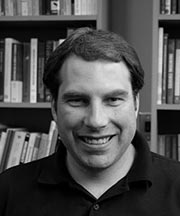
I’ve always believed statistics is a form of communication. My research has been focused on ways to properly tell the story of the respective data I’m analyzing. My dissertation focused on Semi-Markov models which focused on explaining disease progression and recovery within epidemics. The main application was in the progression of HIV/AIDS. Can we describe how patients transition to worse or better stages?
I was fortunate to work in a research group at UPENN as I completed my Ph.D. work.
This gave me a jump right into analytical approaches to real life data analysis. My
work focused on the analysis of Randomized Clinical Trials (RCT). Communication is
still a key component of RCTs but where the focus is properly describing and interpreting
on-average change over time. These change over time models are referred to as Longitudinal
Data Analysis (LDA). My research has focused on finding advanced techniques for the
analysis of LDA consisting of: Mixed Effects Models, Generalized Mixed Effects Models,
Partially Nested Mixed Effects Models, Mixed Effects Markov Models (which combined
my dissertation work with LDA models), and Functional Mixed Effects Models.
Allison Kolpas
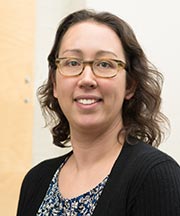
My field of research is mathematical biology. I use a combination of mathematical modeling, simulation, and statistics to analyze data and answer theoretical questions of interest in environmental biology. I am currently co-PI with J. Auld (biology, WCU) on a $213,858 RUI grant from the National Science Foundation from July 1, 2014-June 30, 2017 titled “A theoretical and experimental investigation of optimal mating strategies in a hermaphrodite”; for more details see National Science Foundation Award Abstract #1406231. The grant supports our interdisciplinary research program in evolutionary ecology with WCU undergraduate and graduate mathematics and biology majors. See the West Chester UniversityRESEARCH, SCHOLARLY, AND CREATIVE ACTIVITIES ANNUAL REPORT 2014-2015 for a profile of our NSF funded research (pages 5 and 16). Our latest publication appears in the Journal of Evolutionary Ecology in 2016.
Chuan Li
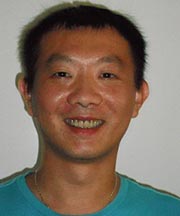
One of my current research interests is to develop a matched Alternating Direction Implicit (ADI) method for solving a large class of problems, called the interface problems, arising in Biology, Materials, and Engineering. The mathematical model of interface problems consists of a parabolic partial differential equation (PDE) and imposed jump conditions on the interface to relate the solutions across the interface. Without appropriately addressing such jump conditions in the mathematical formulation, the standard numerical methods are known to be inaccurate, or even fail, when solving the interface problems. This motivates the development of this matched ADI method in which the central difference is locally corrected to essentially 1D jump conditions near the interface. By incorporating the 1D jump conditions into the ADI framework, the matched ADI method is unconditionally stable and able to restore the second order of accuracy in both time and space for complex 2D and 3D interfaces. This work is a joint research with Dr. Shan Zhao from the University of Alabama.
Scott McClintock
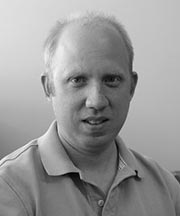
My original research interests, as well as my dissertation research, focused on Mathematical Finance. More specifically, I studied the relationship between arbitrage and state price deflators. Over the years my research interests have substantially broadened. I am extremely interested in Statistical Education and have published articles on my pedagogical practices in the peer-reviewed journals Mathematics Teacher and PRIMUS. I also enjoy more traditional, collaborative statistical work and have co-authored multiple papers using statistical methods to compare various approaches to treating trauma. Currently, I have been working with one of our graduate students on a meta-analysis of trauma-treatment papers. I also enjoy doing more methodological work and most recently have co-authored with a former student a paper in the Annals of Epidemiology on the Misuse of the Odds Ratio.
More recently, I have returned to my academic roots. I have begun work with one of our graduate students on the study of virtual economies. The recently gathered data should lend itself to many different analyses and, as such, should provide research opportunities for any other interested students. If you are one of those students then please don’t hesitate to send me an email!
Finally, I dream of someday working with students to design and implement a study to confirm (or refute) Snapple Fact #33 that termites eat wood faster while listening to rock and roll music (https://www.snapple.com/real-facts).
Mark A. McKibben
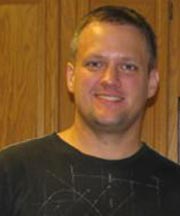
I am classically trained as an applied functional analyst with a specialization in abstract nonlinear evolution equations. Over the past 15 years, I have augmented this training to include stochastic evolution equations and stochastic control theory. My work has applications spanning fields of study, including engineering, epidemiology, population dynamics, pharmacokinetics, and non-Newtonian fluids, to name a few. My most recent research is concerned with developing a theory for different classes of abstract functional stochastic evolution equations driven by a Levy process in a Hilbert space: this work is applicable particularly in electrical engineering and the theory of neural networks.
I have published two graduate-level textbooks on deterministic and stochastic evolution equations and one book on advanced differential equations for senior-level undergraduate students, all published by CRC Press. I wrote all these employing the pedagogical approach of guiding the readers on a journey of discovery of the subject with the intention of instilling intuition in the reader.
James McLaughlin
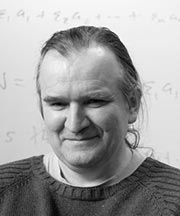
Presently, my research interests are mostly in the area of basic hypergeometric series and related topics, including integer partitions, mock theta functions, and q-continued fractions.
I just recently (January 2017) finished a book on basic hypergeometric, entitled "Methods and Topics in q-series", which will be published by World Scientific.
Starting in 2004 and roughly every two years since that, myself and Nancy Wyshinski organized a special session on continued fractions at the Joint Mathematics Meetings (at the most recent such special session in January 2017, we were assisted by Geremías Polanco). Some information about these special sessions may be obtained by following the links:
- the 2017 Joint Meetings in Atlanta,
- the 2015 Joint Meetings in San Antonio,
- the 2013 Joint Meetings in San Diego,
- the 2011 Joint Meetings in New Orleans,
- the 2009 Joint Meetings in Washington, D.C.,
- the 2006 Joint Meetings in San Antonio,
- and the 2004 Joint Meetings in Phoenix.
Emily K. Miller
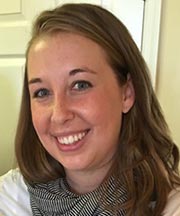
My current research focuses on two main areas: (1) gender disparities in mathematics participation and achievement, and (2) the knowledge, skills, practices, and beliefs of elementary teachers as they transition from teacher preparation programs into teaching.
For my dissertation, I investigated factors contributing to the retention of female mathematics doctoral students. To continue this line of research, I am currently exploring factors that may contribute to differences in publication rates upon graduation between male and female doctoral students in various disciplines. I have also conducted research using The Early Childhood Longitudinal Study, Kindergarten Class of 2010-2011 (ECLS-K:2011), a large-scale, nationally representative data set. This data set was used to investigate early indicators of gender disparities in mathematics achievement for elementary school students (Article: Have Gender Gaps in Math Closed?). Finally, I am involved in a project investigating qualitative differences in the problem solving strategies of high-achieving male and female middle school students.
My second line of research focuses on the preparation of future elementary mathematics teachers. I have been involved with a project aimed at empirically examining relationships between the experiences of pre-service teachers while enrolled in their teacher preparation program and their teaching capabilities post-graduation. Specifically, teaching capabilities were analyzed in terms of mathematical and pedagogical content knowledge, skills for analyzing teaching, lesson planning, and professional vision.
